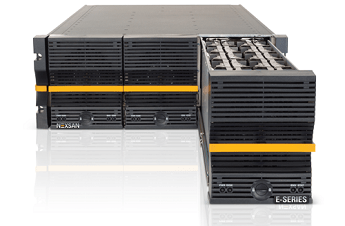While Nexsan’s new Unity unified storage has garnered the media attention, its recently updated E Series P continues to provide most of their revenues.
 Campbell CA-based storage vendor Nexsan has announced the enhancement of its workhorse E Series P-line, the upgraded models of its highly dense and high capacity block storage E-series that it first launched a year ago. The new models add software configurable interface ports, which can be mixed and matched, adding considerable flexibility.
Campbell CA-based storage vendor Nexsan has announced the enhancement of its workhorse E Series P-line, the upgraded models of its highly dense and high capacity block storage E-series that it first launched a year ago. The new models add software configurable interface ports, which can be mixed and matched, adding considerable flexibility.
Much of the focus on Nexsan in the past year has been on its new Unity series, a unified enterprise NAS product with both block and object storage capabilities, as well as private cloud file synchronization. Nexsan was also embroiled in a high-profile fight with Dell EMC over rights to the Unity name, and while Nexsan emerged as the technical winner in court, both companies continue to use the branding. However, while Unity has attracted the attention of the industry, the E-Series still makes up the large majority of Nexsan’s sales.
“The focus has been on the Unity product line, but this release is good to remind the world that the E Series is a critical part of the product line, and that we are continuing to develop that,” said Victoria Grey, Nexsan’s Chief Marketing Officer. “it’s your basic block SAN storage that delivers solid performance. That segment of the market doesn’t get a lot of attention these days. But it’s still the bulk of our sales and we sell a lot of it, as well as the BEAST. They also have a loyal group of channel partners.”
Grey said that while the block SAN storage market is declining, the decline is in single digits, rather than massive, so it still has a large volume.
“Nexsan is absolutely holding our own here,” she said. “The E Series and the BEAST, the little brother, hold their own while we grow our top line with Unity.”
While all of Nexsan’s sales go through channel partners, the E Series is also a channel-driven sale.
“Partners are very familiar with its use cases and product lines for this as well as the BEAST,” Grey said. “Unity is still more of a differentiation for them, so we are working with them to show them different use cases for Unity. The result is that Unity sales are more of a four-legged sales call which is more Nexsan-led, while the E Series is channel-led.”
The E Series P, introduced last September, more than doubled the performance of the E Series. The new enhancements significantly expand configurability.
“They come with 18, 48 and 60 drives, and now support 12 TB drives, for a maximum of 720TB in a U unit,” said Gary Watson, Nexsan’s CTO and founder. “We have switched to software-configurable interfaces, with up to 12 high-speed host interface ports, either Fibre Channel or iSCSI, and you can mix them. Customers want flexibility for iSCSI in the future. In addition, replication in the past has always been 1Gbe, but it was important to beef up the replication engine, so it is now 10Gbe.”
Nexsan will also be announcing support for a vCenter plug in, making this integration much easier than in the past, Watson added
“The higher capacity expands the use cases, and the backup use case is getting better as the last stragglers get rid of tape,” Watson said. “We are selling less today to cloud vendors, who now have a complete stack of open source and white box. But sales for television and film production are increasing because of greater requirements for storage. They like things inexpensive – but not too inexpensive – and are not impressed by frills and bells and whistles, so we are a good fit there.”
The E Series market in the medical space and video surveillance are also expanding.
“With the size of MRIs growing dramatically, and their being stored for longer periods of time, medical bulk storage needs are way up,” Watson said. “Video surveillance demand is up because cameras are getting super cheap, and people are deploying more, and they are being run at 30 frames a second rather than 8.”
Watson also noted that Nexsan’s Canadian business has been coming back.
“Deal registrations have picked up for us,” he said. “Canada has always been important to us because we have a big facility in Montreal for Unity and archiving, but lately business in Canada has been starting to pick up.”











